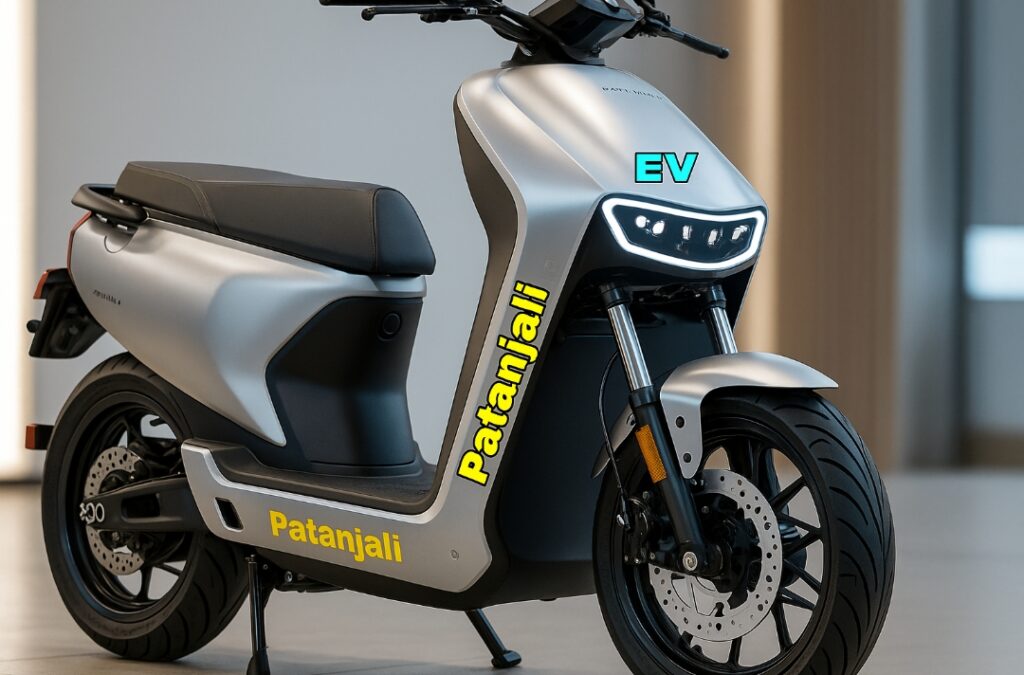PNTAANJALI’s electric scooter 2025 Launched at just ₹14,999 : Know about features, range & specification..!
Despite viral stories claiming a ₹14,000 launch price and a staggering 440 km range, these report are entirely false:
- Independent fact-check show that achieving 440 km on a single charge would require an ~8 kWh battery-impractical for a scooter-especially at that price point.
- Researchers highlight that no current Indian scooter packs more then about 6 kWh, and even then, the top-selling models (e.g., Simple One, Ultraviolette Tesseract) claim only ~250 km range.
- They label ₹14k price-less then most mid-range smartphone-as totally unrealistic.
So what is Patanjali’s actual position in the EV space?
There’s no official EV from Patanjali as of June 2025.
A rumour circulated on X about a scooter named “Yuva,” but no confirmed specs, prototypes, or launch roadmap have been released
Bottom line:
No legit EV from Patanjali yet–just buzz and unsubstantiated claims.
No real technical details (battery, performance, pricing) are available.
No declared mission or EV strategy from Patanjali or Baba Ramdev’s camp.
Patanjali Electric Scooter 2025: Rumours, Features, and the future of EV in India
In recent months, the internet has been buzzing with claims that Patanjali, a household name in Ayurvedic and FMCG products in India, is set to revolutionize the electric vehicle (EV) industry by launching an electric scooter at the highly affordable price of just Rs. 14,999. The scooter, allegedly named “Yuva,” is said to offer a range of 440 km on a single charge, along with a wide set of smart features, However, how much of this is grounded in reality?
This article explores the truth behind these viral claims, the possible motivation for Patanjali entering the EV space, and what the future might look like if the company truly launches an electric scooter in India.
The Viral Buzz: Patanjali Electric Scooter at Rs. 14,999
News outlets, social media platforms, and even YouTube videos have been abuzz with headlines like, “Patanjali to launch electric scooter at Rs. 14,999 with 440 km range.” These reports claim that the scooter will be named “Yuva,” targeted at Indian youth, and will be a budget-friendly, eco-conscious alternative in the two-wheeler EV market.
Debunking the Claims: Is It Too Good to Be Ture?
Industry experts and fact-checking organization have been quick to label these claims as highly misleading or outright false. Here’s why:
- Battery Capacity and Range: Offering a 440 km range would require a battery capacity of approximately 7-8 kWh. Such a battery alone would cost significantly more then the scooter’s claimed price of Rs. 14,999.
- Manufacturing Costs: Even the most budget-friendly electric scooters in India, like the ola S1X or Bounce Infinity, are priced above Rs. 65,000. Achieving a sub-15,000 price tag is practically unfeasible without major compromises on safety, quality, and durability.
- No Official Statement: Patanjali has not issued any official press release or product unveiling related to an electric scooter. Baba Ramdev or the Patanjali corporate entity has made no announcements on this matter in public forums.
Therefore, as of June 2025, there is no credible evidence to support the claim that Patanjali has launched or is planning to launch an electric scooter at this price point.
Why Would Patanjali enter the EV sector?
Despite the current lack of confirmation, the idea of Patanjali entering the electric mobility sector is not entirely implausible. Here are a few reasons why such a move might make strategic sense:
- Diversification of Portfolio: Patanjali has already diversified into sectors like personal care, health supplements, textiles, and food. EVs could be a natural extension of their brand, particularly if they frame it as a step toward sustainability and Swadeshi innovation.
- Eco-Friendly Philosophy: Patanjali’s brand ethos emphasizes sustainability and traditional Indian values. EVs align well with their environmentally conscious image.
- Growing Indian EV Market: Indian’s EV sector is growing rapidly, supporter by government subsidies, rising fuel prices, and increased awareness. the two-wheeler EV segment has seen exponential growth, making it an attractive market.
- Mass Appeal and Brand Trust: Patanjali enjoys wide brand recognition and trust, especially in rural and semi-urban areas. An electric scooter from Patanjali could appeal to budget-conscious customers looking for affordable transport solutions.
What Could Be the Features If Patanjali Launches an EV scooter?
While no official specification exist, based on the current market landscape and consumer expectations, a realistic Patanjali electric scooter might include:
- Range: 80-120 km per charge
- Top Speed: 45-65 km/h
- Charging Time: 4-6 hours
- Battery Type: Lithium-ion with removable options
- Smart Features: Digital display, GPS tracking, anti-theft alarm, USB charging port
- Build quality: basic steel/aluminium frame with utilitarian design
- Warranty: 2-3 years on battery and motor
These features would put the scooter in competition with other affordable Indian EV brands like Hero Electric, Okinawa, and Ampere.
Future Outlook: What If Patanjali Joins the EV Race?
- Disruption in Pricing: Given Patanjali’s history of cost-effective products, their entry might pressure existing EV manufacturers to revisit their pricing strategies.
- Wider EV Adoption: Patanjali’s reach into rural India could help in mass EV adoption where two-wheelers are the most of transport.
- Job Creation and Local Manufacturing: Patanjali emphasizes indigenous production (Swadeshi). An EV manufacturing unit could generate employment and boost Make-in-India initiatives.
- Sustainable Development: With a focus on clean energy and reducing carbon emission, Patanjali could position itself as a leader on eco-friendly transport solution.
However, competing with established EV plyers would require significant investment in R&D, robust customer support networks, and battery recycling infrastructure.
Conclusion :
The widely circulated claim about a Patanjali electric scooter priced at ₹14,999 with a 440 km range is unverified and false. While the buzz reflects public interest, no official launch or EV strategy has been announced by Patanjali. If the brand dose enter the electric vehicle market in the future, it could be a significant development- but for now, such news remains speculative.
